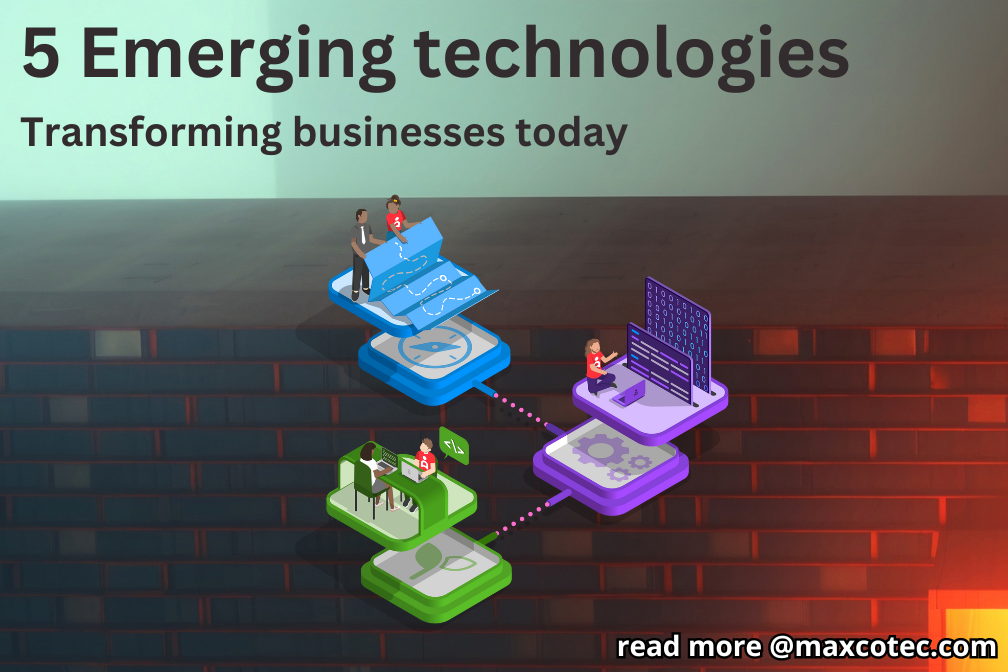The era we live in today is undoubtedly inching closer to the pinnacle of excellence in terms of technology. Rapid manufacturing, blockchain, and artificial intelligence are only some of the groundbreaking technologies that show how far we have come in our journey of continuous technological improvements over the years. Technology has taken hold in various sectors, such as:
- Finance
- Healthcare
- Education
- Arts
- Business
The biggest stakeholder in these technological breakthroughs is the corporate world itself. As much as businesses compete over the uniqueness of their product or service, they’re also facing immense pressure to adapt to the latest technology and use it to their advantage. Businesses must leverage emerging technologies to create unique products, connect with customers, improve operational efficiency, and gain a decisive edge over their competitors.Technology continues to disrupt nearly all industries and has already transformed the way businesses function. Let’s take a deeper dive into some of the emerging technologies that are transforming business operations today according to Tech blogs in USA:
AI and Machine Learning Integration into ERP Systems

Artificial intelligence and machine learning have taken the entire globe by storm. Businesses are actively adopting the “less is more” philosophy by training their systems and automating as many tasks as possible to minimize human dependency. Smart AI-powered ERP systems have eliminated the need for humans to perform mundane tasks related to all areas of a business. From finance to sales, supply chain, production, and even human resources, AI-powered tools and machine learning algorithms help businesses streamline day-to-day operations, support decision-making, and stay current with trends.
When it comes to task automation and machine learning techniques, some industry leaders like SAP are at the forefront of developing advanced ERP AI product designs and incorporating intelligent machine learning techniques. Generative AI and ML tools combined with improved ERP systems ensure end-to-end automation of business processes. These systems can be trained to perform mundane processes like data entry, calculating accrued purchase or sales orders, fraud detection, and product dispatching.
The power of AI in ERP systems isn’t just limited to the internal process of a business. SAP’s latest AI ERP product collaborates with the entire supply chain to predict customer demand, increase production and supply efficiency, and create a sustainable and resilient supply chain network. With consistent training and improvement of AI models, businesses can further increase accuracy in financial forecasting, demand prediction, and risk management.
Robotic Process Automation (RPA)

Robotic process automation is another technology milestone that aims to automate day-to-day tasks through a software robot or bots. These bots imitate human actions like entering data, typing texts, clicking on buttons, etc. They are programmed to perform rule-based tasks that are mostly time-consuming and were previously done by a human. These tasks may include entering invoice data, creating sale orders, calculating accruals, and providing customer support.
Although RPAs have been introduced only recently, they’ve been getting a lot of praise and recognition from corporations of all sizes. The biggest advantage of RPAs is that they can accurately perform repetitive tasks 24/7 without breaks and with zero errors. This helps businesses reduce their dependence on human labor and ultimately cut down labor costs, maintenance expenses, and financial losses attributed to human errors.
However, the implementation of robotic process automation is still restricted to rigid, rules-based tasks. With further improvement in AI models and machine learning capabilities, we can expect RPAs to evolve and become capable of making decisions.
Discover top 15 AARP Games to play in 2024. Enjoy your favourite games online.
Cloud-Native Data Platforms
Data serves as an essential input for critical business functions related to information systems. Businesses rely on data for data-driven decision-making, creating performance dashboards with AI-powered analytical tools and using predictive models to forecast future outcomes. For this purpose, businesses need to make sure this data is securely saved on remote clouds and readily available for use whenever needed.
Thanks to cloud-native platforms, businesses can now cater to their scalability, agility, and performance needs and eliminate the need for on-premises data warehousing. Cloud-based data warehousing solutions offer high-performance analytics and are capable of handling large data workloads. These platforms can automatically scale up or down based on data volume and usage patterns. This means that businesses no longer need to invest in manual infrastructure to ensure data availability and optimal performance.
Cloud-native data platforms can easily handle even the most complex analytical queries with exceptional speed, which means businesses can go deeper with their analytics and make the most of their data in real-time. Businesses can identify inefficiencies within internal operations as well as entire supply chains.
Blockchain Technology

Blockchain technology has shaken the foundations of traditional transactional systems. This public-ledger technology has already disrupted many industries and will continue to do so in the near future. This new approach to data management and security has redefined trust in business operations and challenged the long-held monopoly of banking systems and third-party regulatory bodies.
One of the biggest advantages of blockchain technology for businesses is protecting intellectual property. Businesses can use blockchain to protect patents, product design details, trademarks, and copyrights and prevent unauthorized use.
Businesses reap the most benefits of blockchain technology in preventing fraudulent transactions and unauthorized access. In industries such as banking, real estate, and logistics, blockchain is streamlining processes and reducing the risk of fraud and data manipulation.
Moreover, the transparent nature of distributed ledgers makes blockchain an ideal platform for supply chain management and traceability. Businesses can easily trace their products and raw materials right from the point of sourcing to the point of distribution.
Introducing Hurawatch a free movie and TV streaming platform which is complete free of cost.
The Perfect Duo of 5G Technology and the Internet of Things (IoT)
In today’s data-driven environment, real-time data serves as fuel to a business. The Internet of Things (IoT) has become ever-so-important for businesses to track their products along the entire supply chain and get real-time insights on market trends and consumer behavior. The combination of 5G technology and IoT has the potential to completely transform business operations.
High-speed 5G networks offer the perfect medium for rapid data transmission and communication between devices, which is essential for both IoT devices and data warehousing platforms. Due to their lower latency, manufacturing companies can use 5G technology to connect to their IoT sensors in manufacturing plants. This will help companies receive real-time data on the manufacturing process as well as equipment conditions.
The combination of 5G and IoT has enabled businesses to develop new business models. For instance, businesses can leverage this winning combination to offer new services to their customers. We have witnessed the latest demonstration of this combination in autonomous vehicles. Businesses can leverage the 5G-IoT combination to enhance operational efficiency, enable real-time data processing, and deliver superior digital experiences to customers.
Final Thoughts
Technology forms the very foundation of businesses in today’s corporate world. It’s essential for every business to future-proof itself and invest strategically in innovative technology and solutions. Businesses that can effectively identify, adopt, and integrate these technologies will be well-positioned to thrive in the competitive market and maintain their unique edge.
However, businesses must identify and prioritize the right technologies that meet their long-term objectives and fulfill their operational needs. Businesses must also invest in developing the necessary skills and expertise within their workforce so that they can implement technology seamlessly.






